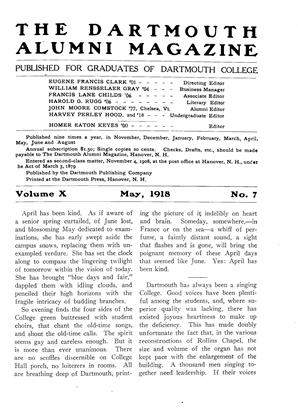Sergeant W. S. Knowles '17
Winfield Skidmore Knowles '17, a sergeant in Company B of the 301st Field Signal Battalion, died of meningitis at Camp Devens at Ayer, Mass., April third, as a result of a fracture of the skull. Sergeant Knowles, whose home is in Boston, entered College in the fall of 1913 from the Lexington High School. Last spring he trained in a signal corps with about fifty other students and received instruction in electrical engineering from Professor F. E. Austin of the Thayer School, including also intensive training in code work with semaphores, telegraph and wireless instruments. He was called intol the Signal Corps of the U. S. Army in the fall and reported to camp, for further training, and received his sergeancy there. Early in March, Sergeant Knowles was kicked by one of the horses of the battalion, which resulted in a fracture of the skull. He was taken to the base hospital at Aver, where he developed meningitis, the direct cause of his death. Knowles' name is number thirteen on the Dartmouth Roll of Honor, and number two on the 1917 class list, Paul G. Osborn, who gave his life driving an ambulance in the American Field Service last June, being the first.
Lieutenant L. S. Ayer '16
Lieutenant L. S. Ayer '16, a member of the 103 rd Massachusetts Field Artillery, was killed in action in France on April 20, according to General Pershing's latest casualty list. He probably gave his life at Siecheprey as on that date fighting in this section was in progress.
Lawrence Sanderson Ayer had his home in Fitchburg, Mass., and was the first man from that city to die in active engagement. He attended Fitchburg High School before coming to Dartmouth, graduating in 1912 as president and valedictorian of his class. Entering Dartmouth in the fall of the same year, he received his degree of Bachelor of Arts four years later. He was a member of the "Kappa Kappa Kappa fraternity.
Lieutenant Ayer was commissioned at the Plattsburg officers' training camp last May, and was sent to France early last fall. In France, he attended the American school of artillery instruction and was assigned to Battery C, while he was in action with the French artillery, but returned to his own battery just in time to get into the thick of the fighting.
A letter from Aver, which was recently published in The FitchburgDailySentinel and which was one of the last that he sent home, stated that he had been in charge of the battery which fired the first American shot in the war. The letter says: "You may be interested to know that the battery which fired the first American shot in this war was stationed where I was last month, and I heard all about it first hand from the captain. I've also been in command when the gun which actually fired the shot was firing out on range."
Lieutenant Ayer is the second Dartmouth man to fall in battle, the first being Lieut. H. F. Eadie '18. His name is the fifteenth to be added to the roll of honor of the College.
M. G. Smith '17
Maurice Gordon Smith '17 was killed April 10 in an aeroplane accident at Fort Worth, Texas.
Smith came to Dartmouth in 1914 and immediately established a reputation for himself on the freshman team, holding a guard position: in the following year Coach Cavanaugh gave him a steady berth as left guard, at which position he made his "D" in the fall of 1915. He was a native of Leominster, Massachusetts, and a graduate of Leominster High School, later of Colby Academy.
Before our declaration of war he left College and shortly afterward enlisted in the Army Aviation. He was transferred to Fort Worth for training last fall, remaining there up to the time of his death. Smith was a member of the Phi Delta Theta fraternity.
 View Full Issue
View Full Issue
More From This Issue
-
 Article
ArticleHOW JUDAH DANA, DARTMOUTH 1795, WON HIS HANOVER BRIDE
May 1918 By James A. Spalding, '66¹ -
 Article
ArticleCOLLEGE NEWS
May 1918 -
 Article
ArticleMARCH MEETING OF THE TRUSTEES—EXTRACTS FROM THE MINUTES
May 1918 -
 Article
ArticleTHE COLLEGE AND UNIVERSITY PROFESSOR A RELIGIOUS PROBLEM
May 1918 By William Hamilton Wood -
 Article
ArticleLETTER FROM LIEUTENANT J. C. REDINGTON '00
May 1918 -
 Article
ArticleCAMPUS NOTES
May 1918








